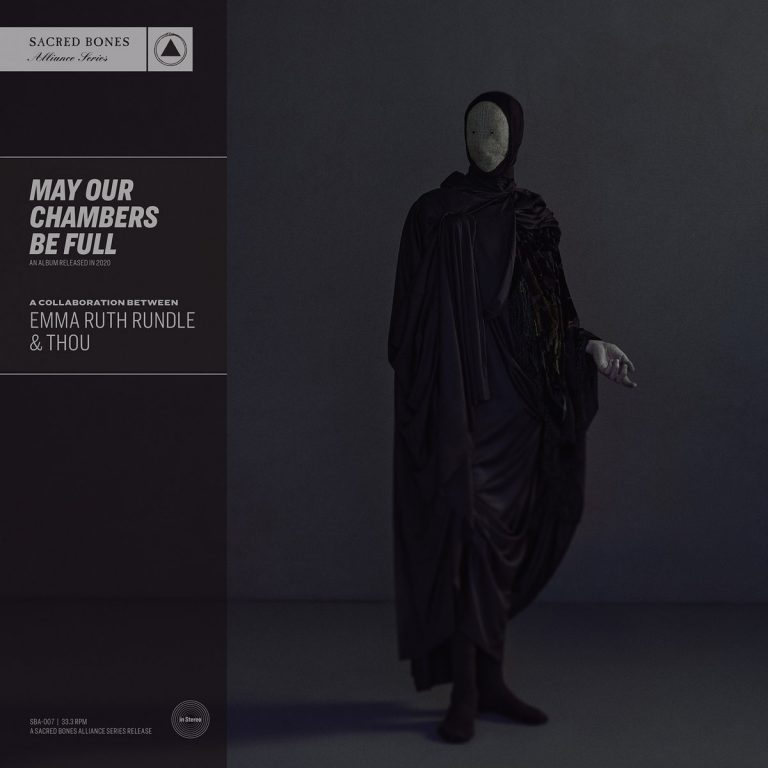Emma Ruth Rundle has carved a niche for herself as the favourite dark-folk artist of all discerning metalheads. Her career path has included stints in slowcore wonders The Nocturnes, post-rock outfit Red Sparowes, as well as the experimental rock of Marriages. Her solo output, starting with 2011’s self-released Electric Guitar: One, has managed to mix the work of her previous bands whilst establishing her vulnerable, plaintive voice to the fore with growing purpose and confidence with each new release. Where Electric Guitar: One is an experimental guitar workout, her most recent solo record, 2018’s hauntingly beautiful On Dark Horses, highlighted her ability to deliver more traditionally structured songs which were heavy in claustrophobic atmospherics and tempered ennui.
Baton Rouge’s Thou, the epitome of DIY anarchist sludge metal, are no strangers to collaborative releases, after working with The Body on a couple of wonderful records and having more split releases in their back catalogue than is likely healthy. Their brutal onslaught of noise, coupled with ERR’s achingly honest vocal delivery, makes May Our Chambers Be Full an astonishingly powerful listen. The talents on display intertwine playfully, with neither of the core elements and influences being more dominant than the other for vast swathes of the record’s run time. It’s a perfect hybrid, an amalgam of seemingly different aspects on the alternative musical spectrum, brought together masterfully through restraint, skilful song writing and confident arrangement.
Album opener “Killing Floor” allows Thou to shimmer like never before, and Emma Ruth Rundle to become more menacing than we’ve heard her go. The tone is set early for an album that doesn’t merely cherry pick elements of each artist’s particular output, but melds them together to produce a body of work which sounds like both yet neither. The hazy distortion allows Rundle’s voice to sparkle on top, whilst Bryan Funck’s black metal hollering is placed lower in the mix, repeating vocal lines in his own inimitable manner. The interplay between the instruments and vocals feels strange at first as the two distinctive sounds are dissected by the listener, but with more listens the record reveals itself to have a uniformity, a coherence in union which fees ever stronger or repeat plays.
“Monolith” is a nod to 90s grunge and punk sensibilities and momentarily alleviates the dark, studious mood set by the first track. The gloom descends again on “Out of Existence”, which places Rundle’s voice front and centre until huge riffs and Funck’s feral voice take over. Where “Killing Floor” allowed the collaborators to blend their sounds, here they take it in turns to be the centrepiece of the track – you almost get a sense of a tag-team approach to the writing as the song continually veers from ethereal dark-folk to intense sludge metal. Needless to say, it’s ace, and after three tracks there is no obvious template at play, which is a wildly refreshing approach for such a venture.
A post-rock haze brings “Magickal Coast” to life, before slowing to a snail’s pace as chimes gently ring out, before a crashing tsunami of guitars engulf the listener. It’s the classic loud-quiet-LOUD formula, where you can almost see the distortion pedals being stamped on in your mind’s eye. It’s a head rush of competing focal points thereafter, with Rundle opining away while Funck seemingly lacerates his own vocal chords to his great personal delight. It’s an absolute thumper of a track that defies expectation, with the disparate influences and performances pulling you this way and that.
Nine-minute album closer “The Valley” is the longest track here, and feels most like a straight up Emma Ruth Rundle song compared with anything else on May Our Chambers Be Full. It shudders with pure sentimental, romantic despondency as it grows in volume and urgency. Just after the halfway mark the track falls apart, with just a tom heavy drum beat left, a few noises veer in and out of focus and you await the almighty crash which you sense is coming – the noise being heralded by the calm before the storm… but then the obvious never materialises and the track continues on its melancholic way and simply doubles down on its gorgeousness rather than shifting gear. A wall of noise is reached before Funck comes back into the fray, again his voice echoing Rundle’s, before the track weaves its way through some Celtic strings at the record’s denouement. It’s an ending full of beauty, an almost nostalgic feeling hanging heavy in the air as the expectations of the listener wander off into the distance entirely unmet.
May Our Chambers Be Full is that rarest of things – a body of work which combines but does not try to obscure the strong individual artistic voices of the collaborators. It’s the document of two beloved alt-metal worlds colliding to head-shuddering effect; a record of skull crushing intensity in places, with merciless riffs conjured up from the deepest abyss, which are counterpoised with quiet, ethereal dark-folk introspection – a mix that shouldn’t really work but absolutely does.

